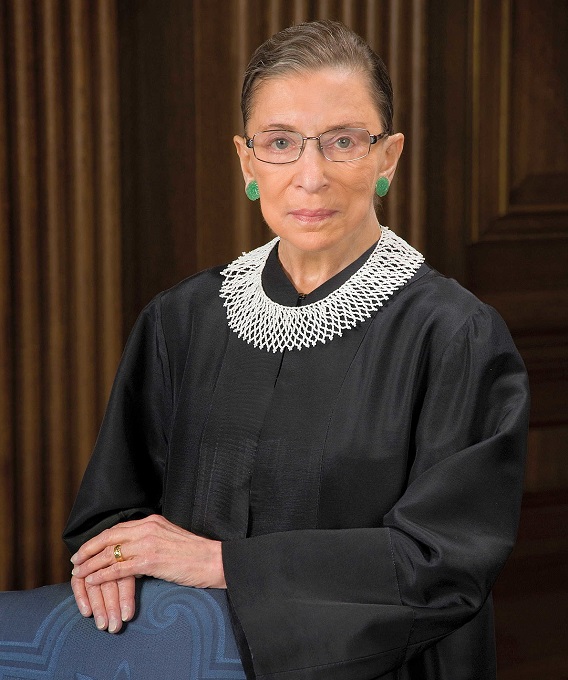Supreme Court Justice Ruth Bader Ginsburg, a seminal force in the fight for gender equality and women’s rights and only the second woman ever elected to serve on the US Supreme Court, died Friday due to complications related to metastatic cancer. She was 87 years old.
Ginsburg was in the middle of her 27th year serving on the Supreme Court, and held a decisive position for liberals and the Democratic Party in opposing legislation to remove policies such as the Affordable Care Act and accessible abortion services. As a woman who upheld progressive policy, she faced consistent opposition in the male-dominated and increasingly conservative Supreme Court, and earned a reputation as a proud dissenter and champion of women’s voices. Despite concerns about her ability to serve given what many called a fragile appearance, Ginsburg was committed to her service, stating she would keep her position “as long as I can do the job full steam”.
Politically, Ginsburg’s death has created a vacancy in the Supreme Court that has serious implications for the upcoming US Presidential Election, as well as the future of the judicial branch in general. Supreme Court Justices serve for life, meaning the appointment of a young conservative now, in place of the liberal Ginsberg, would shift the balance of the Supreme Court for decades. In a statement Friday evening, Senate Majority Leader Mitch McConnell said he intended to appoint a Trump nominee before the end of the year. “President Trump’s nominee will receive a vote on the floor of the United States Senate,” McConnell said. If McConnell gets his way and Trump’s currently unknown nominee is appointed, the Republican Party would control six of the nine seats on the Supreme Court. For her part, in her final days, Ginsberg had expressed how her “most fervent wish is that I will not be replaced until a new president is installed.”
President Trump already elected two new Supreme Court Justices during his presidency, those being Neil Gorsuch and Brett Kavanaugh. Whether or not Trump can pull off a third appointment remains to be seen, and would depend on a number of factors, including the perceived political position of the candidate, the reaction of Republican moderate Senators and how the voting public would react to an accelerated process prior to the election. There remains nonetheless a strong will in the right-leaning Senate to appoint a new Republican justice before the November 3rd election, or even before Biden’s inauguration should he win. In any case, the open position is an important incentive for Republicans who might be on the fence about whether to vote for Trump or Biden. While another Trump presidency may not appeal to those centrist conservatives, especially in light of what many consider a grave mishandling of the coronavirus pandemic, the possibility of enacting a solid Republican majority in the Supreme Court for years to come may entice them to Trump’s side of the aisle again.
On Friday night, following the news of Ginsburg’s death and McConnell’s subsequent announcement, Joe Biden issued a statement: “There is no doubt — let me be clear — that the voters should pick the president, and the president should pick the justice for the Senate to consider.” Biden then pointed out the inconsistency of the Republican Senate on this situation in the face of a potential win for their party: In 2016, the Republican Senate (led by Mitch McConnell) blocked President Barack Obama’s nomination of Judge Merrick B. Garland in the last ten months of his term. Now, in a similar situation and with control of the Senate and the presidency, Republicans are changing their position and will pursue the appointment of a Trump nominee.
The Republican Party currently holds a 53-47 majority in the Senate, indicating an advantage for Trump’s nominee, however there are four Republican swing votes which could change that balance. Utah’s Mitt Romney, the only Republican to vote to impeach Trump, is one. In addition, both Maine’s Susan Collins and Alaska’s Lisa Murkowski have expressed that they would not support a vote on a replacement until at least after Election Day. Finally, Senate Judiciary Chairman Lindsay Graham said that he would not support another Supreme Court appointment under Trump at all. These four Senators, therefore, may hold the future of the Judiciary Branch in their hands.
With Election Day rapidly approaching, the Supreme Court vacancy presents an opportunity for President Trump. First, the nomination process is likely to detract from coverage of the coronavirus, which has been a sink issue for him. Secondly, Trump can use his nominee pick to play to certain constituencies he’s currently struggling with, such as women and people of color.
However this breaks down over the next few days and weeks, in what is the most important election of modern times, the stakes just got higher.
For Times Media Mexico
Kieran Hadley in Idaho


